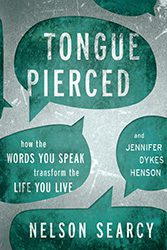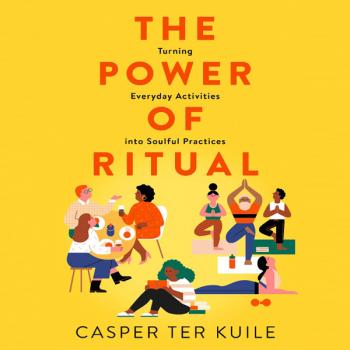“Words are never neutral. None of us has ever spoken a neutral word in our entire life. Every word that comes out of your mouth and mine has a consequence attached to it, and that consequence will either be positive or negative.” — Nelson Searcy, author, Tongue Pierced
This month in the Patheos Book Club, we’re talking about the new book Tongue Pierced: How the Words You Speak Transform the Life You Live, by popular pastor Nelson Searcy. Here, Searcy talks about the power of words and what he most hopes readers take away from the book.
What inspired your new book, Tongue Pierced?
I have always been fascinated with the notion that the words we speak really do shape our reality. Several years ago, I taught on this topic at my church in New York City, The Journey. The truth about the power of words resonated profoundly with everyone who heard the messages. Not only did they come to realize that words are a reflection of the heart, springing from the inside out, but that we can also do a lot to better our lives simply by choosing to be more intentional about our words choices and letting those choices take effect from the outside in.
 I believe it was Mother Teresa, who said: “Words that do not increase the light of Christ, increase the darkness.” Would that be a good summary of your book’s message?
I believe it was Mother Teresa, who said: “Words that do not increase the light of Christ, increase the darkness.” Would that be a good summary of your book’s message?
That’s a powerful statement – and it’s very true. It aligns with one of the central tenets of the book. That is, words are never neutral. None of us has ever spoken a neutral word in our entire life. Every word that comes out of your mouth and mine has a consequence attached to it, and that consequence will either be positive or negative. What you say will either take your faith, your health, your relationships, your work, or whatever else you may be speaking about in a better direction or it will slowly chip away at the foundation of those same things. Every word is a seed that takes root somewhere and begins producing a crop.
So, yes, if our words are flowing from a heart centered on Christ – centered on his love, his mercy, his grace, his generosity – then they, by default, will be words that increase his light in the world. Or to put it another way, they will be words that manifest and reflect his truth in our own lives and in the lives of the people we influence. On the other hand, if our words aren’t directed by a heart filled with his love, but instead only echo our own nature, feelings, opinions and biases, then they won’t do much to advance Christ’s message or his light to the world around us.
Are there times when it’s appropriate to use harsh words?
Jesus didn’t shy away from using harsh words when he needed to. Just think about his words to the Pharisees in Matthew 23. The Pharisees were making a mockery of true intimacy with God, leading people into empty religion full of self-promotion and show. So, he confronted them with some pretty harsh words. He called them snakes and sons of vipers. He rebuked them for their hypocrisy and told the crowds not to follow their example.
Similarly, in our own lives, there are times when harsh words do serve a purpose. When we see injustice, we need to address it – and that will often call for words that we wouldn’t normally speak. But when those words are spoken prayerfully, wisely, and are truly helping to correct a wrong that needs to be corrected, they are justified. The key is to make sure they are coming from a heart focused on God’s truth and love, rather than on our own ideas, preferences, or emotions.
Tell us about your “30-Day No Cursing Challenge.” How have you used that in your church, and how can others join the campaign in their own church communities?
The 30-Day No Cursing Challenge is about intentionally removing words from your life that only have the power to hurt you. In our culture, cursing often seems like such a non-issue. We think that it doesn’t matter if we throw in a few choice words here and there. But, just like all of our words, those curses carry power. They are inherently negative and destructive. I compare constant, casual cursing to taking small, daily doses of poison. Over time, the words begin to shape our thoughts, our attitudes and our actions in a harmful way.
We have issued the 30-Day Challenge several times in our churches, and the response is always overwhelmingly positive. People usually decide to give the challenge a shot on faith, not really knowing if it will affect their lives in any real way. By the end of the 30 days they are sending me letters and emails raving about all of the ways their lives have changed – just by being intentional about this one category of language! They find that they have a better attitude day in and day out. I often hear that letting go of curse words improves their relationships, because they have to focus on filling their conversations with more uplifting language. The benefits go on and on.
Let me be clear, though. This isn’t a legalistic issue. God isn’t going to love you any more or any less based on whether or not you curse. It’s simply an exercise in seeing how removing death-filled words from your vocabulary can lead to more life.
The best way to take part in the 30-Day No Cursing Challenge is to ask your pastor to lead a church-wide campaign on the power of words and issue the challenge as part of that. Small groups can take this on together and encourage each other in their efforts.
For additional church resources supporting the book, and to learn more about the 30-Day No Cursing Challenge, visit TonguePierced.com.
You talk about how our subconscious thoughts are as important to attend to as our conscious thoughts. This may seem daunting to folks, as it suggests a deeper work than just watching our swear words. Can you say more about why this is important, and how we might go about taking control of how our subconscious thoughts transform our reality?
The Bible tells us to take every thought captive – and with good reason. Our thoughts are the precursors of our words and our actions. They direct everything we choose to say and do. Then, those words and actions literally create our everyday reality. It all begins with what we allow to run around in our minds day in and day out; with the conversations we have when we talk to ourselves.
The first step in taking control of thoughts is simply to become aware of them. You have to key into what you are thinking about. Are you thinking about the good in your life or are you focusing on everything that’s wrong? Are you constantly putting yourself down or are you choosing to think of yourself in a positive light? To see yourself the way God sees you? When you think about your relationship with your spouse or your children, do you dwell on the problems and on what needs to change or do you fill your mind with the good aspects of those relationships?
Every moment of every day you and I get to choose how we direct our thought life. With a little awareness and intentionality, we can make sure we are thinking thoughts that work for our betterment, thoughts that lead to words and actions that will foster the life we want instead of keeping us stuck in a place we don’t want to be.
What kind of ‘success’ stories have you seen in your own ministry as a result of preaching this message of ‘words matter?’
We’ve had so many life-changing stories come out of the Tongue Pierced teaching over the years. At The Journey, several thousand people have gone through the Tongue Pierced material and hundreds have taken the 30-Day No Cursing Challenge. Incredibly impactful testimonies have been created as these truths have intersected people’s lives.
My favorite success story is one from a Wall Street executive who was part of our church. At the end of her 30-Day No Cursing Challenge, she told me that the challenge had given her an opportunity to live out her faith in the workplace in a more tangible way than anything else she had ever done in her twelve years as a Christian. It was something that really set her apart in a culture full of cursing, and gave her the chance to talk to her friends and co-workers about why her language had shifted.
Many other people I know, including myself, just keep recommitting to the Tongue Pierced lifestyle and praying we can make it 30 consecutive days without cursing!
Who do you hope reads your book and what do you most hope people take away from your book?
I hope everyone reads it! Seriously, my prayer is that this is a book that will resonate widely, with believers and non-believers alike. The truth about just how powerful words are applies to anyone and everyone who wants to live the life they were created for – and isn’t that all of us?
I hope our readers will take away an understanding of just how significant their words choices are. I want them to know what steps they can take to harness their words for their own good and for God’s glory. Prayerfully, that knowledge will take them deeper in their faith, grow their most important relationships and help them create the circumstances they want in their lives.
God created the world with his words and he has given us the power to create ours in the same way. My hope is that Tongue Pierced will draw people everywhere closer to the abundant life God has for them, by showing them how to take advantage of the wonderful gift of words.
Read an excerpt from Tongue Pierced – and what Patheos bloggers are saying about the book – at the Patheos Book Club here.












